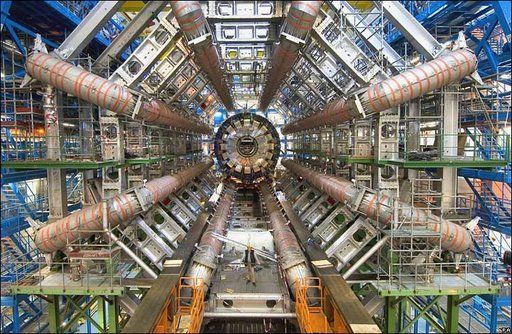The Large Hadron Collider, the world's largest and most powerful particle accelerator, was launched in September 2008 to much fanfare. It was expected that the collider would address the fundamental quesions of physics, removing obstacles to our understanding of the most profound laws of nature. Of course, the reality proved a little more mundane--an electrical fault caused one tonne of helium to leak into the tunnels containing the LHC, resulting in the collider being switched off a mere nine days after being started.
But as the LHC is ready to be re-launched this weekend, it is an appropriate moment to revisit two pieces from the Prospect archive which explain why the collider is so important, and what exactly goes on inside CERN, the European Organisation for Nuclear Research, which runs the collider.
First up is Lisa Randall's piece from September 2005. Randall, who is professor of physics at Harvard University, wrote of her expectation that the LHC could "uncover some of the mysteries of the universe":
"Why do we see the particular forces we see, and are there any more? What is the origin of the masses and properties of familiar particles, and why do those masses take the values that they do? And why is gravity so weak?...The questions about mass and the weakness of gravity tell us we will soon learn more about the fundamental nature of matter. In a few years, the universe will be prised open and the secrets of the cosmos will begin to unravel. I, for one, can’t wait."
Then in October 2007, Prospect sent Gwyneth Lewis, former Welsh poet laureate and poet-in-residence at Cardiff Astronomy department, to CERN's headquarters near Geneva to try and make sense of the machine and the people behind it. Lewis had expected the site to be, as in Dan Brown's portrayal, "like a military base for the nuclear age, with supermarkets and a free-fall machine in which tired physicists can relax", but instead encountered a hippie-friendly campus atmosphere, an technology less overwhelming that she had sh had imagined:
The hardware had been reminding me of something and as we moved along a narrow scaffold, it came to me: Dr Who. It felt as though we were on a low-budget film set designed by somebody who was approximating what cutting-edge technology would look like. Except that this is the frontier of modern experimental physics. My disorientation was deepened momentarily when my guide mentioned, in passing, that John Barrowman, who plays Captain Jack in the Dr Who spinoff Torchwood, had visited Cern the day before. We agreed that we were great fans of the new series, that Russell T Davies was a genius, and speculated that Captain Jack would turn out to be Dr Who’s brother. (We were wrong.)
Both pieces are now free to read on www.prospectmagazine.co.uk.












